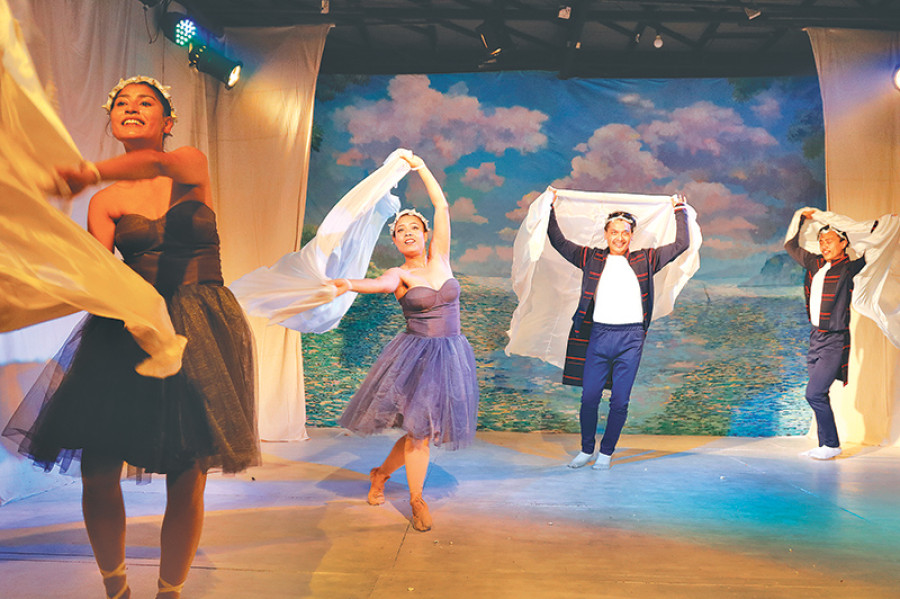Miscellaneous
The eloquence of silence
The Ugly Duckling turned out to be a misnomer. Bullied for being different, slow and clumsy compared to his siblings, the so-called ugly duckling struggled all his life to find love and acceptance. He wanted to fit in. And he almost broke himself trying. Only to later realise that he was not a duck but a Swan.
Sandesh Ghimire
The Ugly Duckling turned out to be a misnomer. Bullied for being different, slow and clumsy compared to his siblings, the so-called ugly duckling struggled all his life to find love and acceptance. He wanted to fit in. And he almost broke himself trying. Only to later realise that he was not a duck but a Swan.
Based on this beautiful fairy tale by Hans Christian Andersen (first published in 1843), there is an equally beautiful production, currently ongoing at Mandala Theatre. An apt and timeless allegory, the story is a celebration of personal uniqueness and individuality in a conformist world. The plight of the ‘ugly duckling’ is immediately relatable for all of us as all of us have felt lonely and have been misunderstood. The story tells us to persevere by embracing individuality while also betraying a laughably tragic situation—your mind is your own kingdom of solitude that no one else truly sees and in this, we are all alone together.
Most of the story is told in silence, through gestures and physical acting. There are maybe three sentences as dialogues throughout the hour-long play. Since there are barely any words in the play, you will naturally focus and scrutinise the tiniest of details. The actors’ movement, abundantly absorbing and engrossing, can make one forget of anything but the present moment elapsing on stage. While watching the play, it is easy to forget that there is a plot, an arc, and a ‘consequential beyond’ to what is presently seen. Then there is Najir Hussain brilliantly acting out the heartache of always being the odd one out.
That said, a sad tale need not necessarily be a mopey one. As the mother duckling attempts to teach her young ones the ways of the world, the ‘ugly duckling’ walks to the beat of his own drum, much to the annoyance of his siblings who are capable of and satisfied with following whatever instruction conveyed to them. In the ugly duckling’s sheer clumsiness and inability to follow the norm there is plenty to laugh about. The play goes on to show the horror and virtue of being different.
With a minimal set, the play tells a universal story. It relies on physical language to drive the story forward and winds up being a meaningful experience for one and all. There were hardly any dialogues and yet the audience was enrapt which I think proves that superb acting and directing can compensate for the lack of dialogues in a play. To take the example of cinema, this play does a similar thing to what Charlie Chaplin and Buster Keaton movies did, basically, telling engaging stories without relying on the most prominent form of communication—words.
Such a play, however, comes with its own set of pitfalls. Silent plays depend heavily on symbolic gestures that maybe or may not be understood by the audience. The final revelation in this play, for example, where the ugly Duckling turns out to be a Swan, is not quite clear. Instead, it seems that the Swan was ultimately accepted by the community it was born into. But if that is the case, it is never made clear what exactly brought about the Swan’s acceptance into a duck community.
Ugly Duckling is great to watch, thanks to the actors. Najir Hussain, who plays the title role, is impeccable and the rest of the crew deserves praise as well. If you are someone who goes to seek the thrill of theatre regularly, you can tell that Binita Gurung, Kiran Shrestha, Vijaya Karki and Bikram Shrestha have grown as actors, and this is their best performance till date. Seeing them act is reason enough to go watch this play.
The Ugly Duckling is being staged from 5:30 onwards until June 3 at Mandala Theatre, Anamnagar (except for Mondays). Matinee show starts at 1:00 on Saturdays.
@NEPALICHIMNEY




 22.37°C Kathmandu
22.37°C Kathmandu










